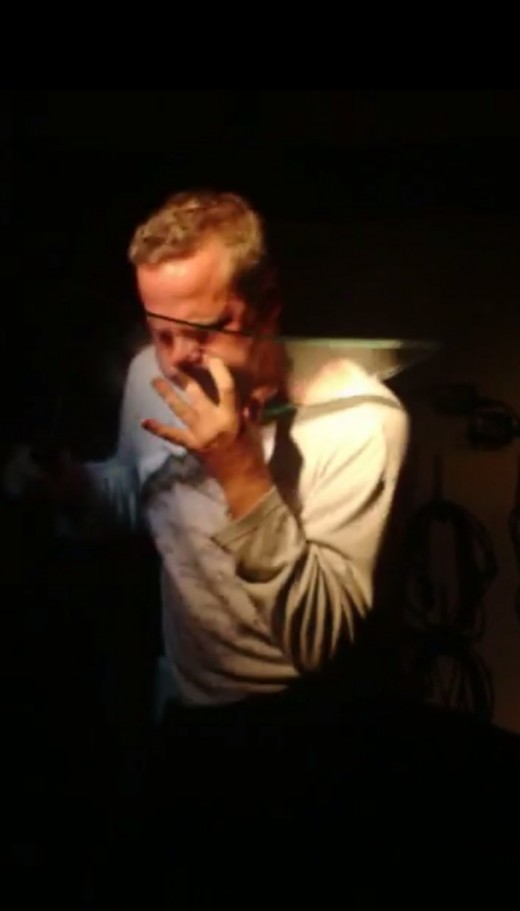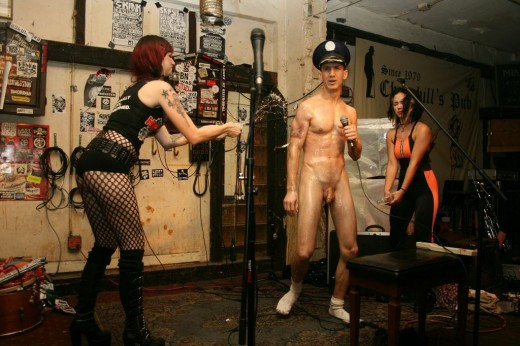Our Beloved Shithole: A Eulogy for Churchill’s Pub
Rob Goyanes

Photo: Ricky Vazquez
Equally a kitschy punk slash rock destination for tourists, and a locally infamous, near-lawless dive bar and live venue, Churchill’s Pub is a special place not at all common in Miami, much less many other places. Since 1979 it has dangled between respected institution and Dionysian dystopia, baffling first time visitors and regulars with its pageantry of degenerate recklessness, total lack of pretension, and unforgettable performances, by artists and publics alike.
It’s an outlier that’s contrary to the rules, conventions, and expectations of Miami nightlife, for better and worse, and opened its doors to those with nowhere to go, whether for a cheap drink, a place to play (or be on the lam), or a chance to witness performances one can’t unsee.
Besides spectacle, Churchill’s dealt banal, everyday bar culture, the kind that bonds and breaks and occasionally reproduces select breeds of people. It was around long enough to be considered an institution, in more ways than one. But like all things good and or bad, and or humdrum, its time has come to pass.
THERE ARE 13 SATELLITE DISHES OF VARIOUS SIZES AFFIXED TO THE ROOF AND VISIBLE FROM THE OUTSIDE PATIO: 24” ONES FOR TRANSATLANTIC FOOTBALL AND RUGBY GAMES, A COUPLE GREAT BIG UGLY ONES FOR WHO-KNOWS-WHAT. ONLY FOUR OF THEM DO NOT WORK.
Dave Daniels sits across from me at a cluttered desk. We’re in his office, which is in the house that sits across from the outside bar. You enter the bright yellow domicile through the kitchen. He’s lived there, somehow tolerating the decibels and frenzy, since 1981, thus qualifying Churchill’s as the “Sort of English Pub” it’s marketed as, since true pubs have a landlord who lives on the property.
Originally the C&H Bar (named for the elderly Charlie and Harriet who opened the neighborhood wine and beer establishment in 1948), Daniels tells me “it was a daytime bar that closed around 7 p.m., and was frequented by old-timers. The average age was about 75.” Daniels, with his white hair and eyes a mix of sharp and sallow, is 73. He’s given many interviews, especially recently, and is self-aware of the spiel that he starts out with.
It’s an impressive one still: Churchill’s has hosted more performances than any other venue in the United States, possibly the world. Only counting acts with names once (i.e. not including repeat performances by the same band or individual), and not counting all the open-mic nights, acoustic acts and unofficial, spontaneous, impermanent, lost-to-history assemblages (and there are many)—about 20,000 acts are calculated to have played.
The venue, besides being home to the monochromatic index of guitar-idolizing crotch and buttrock, has also been an enduring refuge for the punk, metal, and jazz scenes of South Florida (and the crossover between the former and latter). Its material constraints satisfy the civic need for a solid mid-size venue with strong and cheapish drinks, bringing in touring bands that would otherwise not venture so far down into Florida, or stay away altogether.
Locally it’s been a petri dish for a culture of musicians and performers who simply couldn’t and can’t play anywhere else. This group runs the gamut of pimply teenaged geeks who’ve never performed live, crappy bands at it for way too long but who perhaps love what they do, and the mix of self-serious and less-serious “artists” working with ideas and corporeal elements not-so-palatable in terms of live music, but who’ve been exhibited at the International Noise Conference for the past 11 years.
CHURCHILL’S PUB HAS 4 OUT OF 5 STARS ON YELP.
Without Daniels, these things would not have been possible. But he’s more interested though in talking to me about his gripes with the city of Miami and the things he wanted to do but couldn’t because of the city’s bureaucratic fumbling, and speculated about the crowd at Churchill’s for the upcoming World Cup.
However, he did reveal some of the odd, early social history of the club, like how a group of journalists working for United Press International used to work at the bar and rigged the phone and fax system to file their copy in between gins and bourbons. The stories included those about the 1980 race riots that had shut down the vast majority of bars across Miami, but not Churchill’s. They also played on a dart team together.
Though Daniels is clearly fond of the club—at several points there was hurt visible in eyes—he just sold it to a group of investors for $1.8 million. He’s ready to retire, and has started planning a European cruise.
THOUGH THE CLAIM IS NOT 100% VERIFIABLE AND I WOULD NEVER, EVER ASK HIM ABOUT IT, THERE IS AMPLE EVIDENCE TO SUGGEST THAT DAVE DANIELS HIRED BARTENDERS BASED NOT ONLY ON THEIR PRUDENCE AND REQUISITE BOLDNESS, BUT ALSO ON HOW NICE THEIR LEGS ARE.
Located in Little Haiti off Northeast 2nd Avenue and 55th Street, it’s a massive complex of connecting structures, carved in a way that makes for intimate sections and copious configurations of human/nonhuman interactions. There’s the main bar that bifurcates the main stage and pool table area, a number of fabled bathrooms, the outside bar and patio, a stage area even further back with a tent that makes it seem circusy. A hallway of kegs and industrial-size fridges leads to the Dan Hosker studio, named after the deceased veteran of the Miami music scene. (There’s also the laundry room. Cheapest laundry in town.)
Each surface is a sludgy and ashy palimpsest of the cultural comings and goings: flyers and stickers placed over each other, instruments and corporate collateral toting beers and liquors, memorials to the dead, debris and wreckage left over from previous nights, weeks, years.

Justice Yelden playing a piece of glass at INC 2008. Still from video courtesy of Matt Priera.
Churchill’s is authentic, and it is inimitable. There was the time Chuck Loose of ‘90s Miami punk band Chickenhead lit himself on fire and freaked out as he ran through the crowd. The time Marilyn Manson started his career there, with the Spooky Kids.
Or the time that Justice Yeldham played a piece of mic’ed glass with his face, lacerating his cheeks and lips as he raspberried it and suckled its sharp edges, producing the sound of a million screaming squeegees before crescendoing in a blast of shattered glass across his forehead. Spectacles like these do much to distinguish Churchill’s.
CRIP IS THE ONE WHO TRAINED SAINT. CRIP INTERMITTENTLY DISAPPEARS FOR PERIODS OF TIME THEN REMATERIALIZES IN HIS REFLECTIVE VEST, WITH THE SHAKY, POLITE DECORUM BROUGHT ON BY CHEMICAL DEPENDENCE. THE PARKING CREW IS AN AMORPHOUS UNIT, WITH SHIFTING RELATIONS AND DYNAMICS, MUCH LIKE CHURCHILL’S.
Though it may seem like it, Churchill’s does not exist in a vacuum. Dave Daniels and his management and staff have engaged the surrounding community and municipal political apparatus since the pub’s inception, and while this engagement has not always been positive (for Churchill’s or for the neighborhood or city), there’s been a negotiation that imbues it with socio-historical curiosity and significance.
Miami-Dade Police Commander Evans Ford, who leads operations in Little Haiti, says that Dave Daniels has been “good to the community—some of the guys that gave him problems and then came back around, [Daniels] would make up with them and try to give them work.”
“Some of these guys have gotten a second and third chance even after stealing from him,” Commander Ford adds. “He has a big heart.”
Little Haiti’s struggles with poverty, crime, and drugs thread through the history of the club. Racial divisions and class disparities come to the surface immediately when entering the parking lot, where a crew of semi-legitimate attendants—all Haitian or African American—tend to the parking needs of the mostly white crowds for tips. Daniels has not given these attendants permission, and expressed explicitly that “they are trespassing,” though he claims that he “can’t really do anything about it.”
Saint, who has worked in the lot for 14 years, was born and raised in the area, and says “It’s more than just watching the cars you know, we’re like the first people that they meet. We’re the first to greet them and make them feel comfortable out here so they can relax and have a good time inside. We’re professional concierges…” He then adds, with a slight smile, “…and deliverers.”
DUE TO THE EXTREME PRESENT-TENSENESS OF THE SUBJECT AT THE TIME OF THIS WRITING, HERE’S A LIST OF WEIRDLY VIOLENT ACTS OF AFFECTION THAT HAVE HAPPENED OR ARE RUMORED TO HAPPEN AS THIS GOES TO PRESS: LOOTING OF EPHEMERA, ACTS OF DESTRUCTION (SUCH AS THE BEHEADING OF THE INFAMOUS MARLIN THAT MADE AN APPEARANCE IN THERE’S SOMETHING ABOUT MARY), AND THREATS OF BURNING THE PLACE DOWN.
There’s been much speculation regarding what will happen now that Daniels has sold the bar, but there’s no way of knowing until these changes take effect. Daniels and other sources say that the owners—whose identities have not been revealed and who turned down a request for an interview—plan on keeping the Churchill’s brand, and running it as a “rock bar.”
The openness and suspension of specific legal and moral codes is what made Churchill’s such an uncanny place, as well as an indispensable resource to the music community. During a performance, you could destroy tables and chairs, maim yourself, defecate and/or vomit—either as performer or audience member—but only if you had earned the right to do so, did it with some level of respect, and if the context called for it.

Aiden Dillard performing at INC 2012. Photo Courtesy Bleeding Palm.
“They let anyone play there. You just can’t do that in a lot of cities,” says Milgrim. Reskin hopes that the new potential owners of Churchill’s “recognize the value that it has in the scene, and the special place it holds in many people’s hearts.”
Important and whatnot, there’s also general agreement that Churchill’s is also just a bar, and one with serious drawbacks too: it leans toward a specific brand of band-centric music; it circulates intoxicants for ersatz semblances of community; and is often just a collection of bros unnecessarily moshing.
Beneath this, at the core of Churchill’s are the three generations who have seen the best and worst of each other. Those who’ve celebrated births, mourned deaths, gotten into fights, and grumbled about all the mundane moments, mediocre bands, and general misshapenness of their everyday lives. They’ve come to revere and loathe the place with the same mix of esteem, adoration, disgust, and frustration that is reserved for one’s own family and home.
In a way, lamenters should be glad that Churchill’s is changing. It’s the opportunity for people to figure out other spaces for shows, conduct their own experiments in aesthetic freedom vs. general welfare, and learn how to organize these types of things for one’s self, and others.
Whatever happens, positive or negative, the story of Churchill’s is one of ups and downs—of memories branded-in-the-brain, and those long forgotten; of the search for relief through dangerous states of consciousness and the comfort of fleeting moments of lucid clarity, the moments only brought on by the expressive power of sublimely flawed individuals, who are all just looking for the same, unspeakable thing.
So, like most stories, it’s one of love and loss. And shit.










